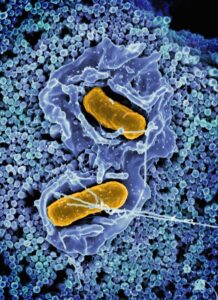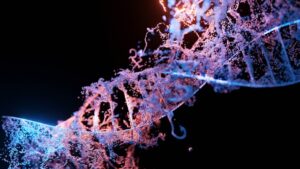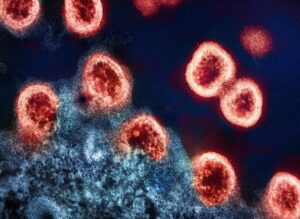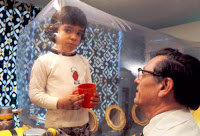 All things change in order to develop and expand. In biology, the theory of evolution explains that
All things change in order to develop and expand. In biology, the theory of evolution explains that
Groups of organisms change with the passage of time, mainly as a result of natural selection, so that descendants differ morphologically and physiologically from their ancestors.
In layman’s terms, morphologically means “in appearance” and physiologically means “with regard to function.” Natural selection is the concept that
only the organisms best adapted to their environment tend to survive and transmit their genetic characters in increasing numbers to succeeding generations, while those less adapted tend to be eliminated.
Even in the most basic definition of the term, evolution implies that some type of change must occur. With regard to the scientific theory, it explains this change in purely genetic terms. Indeed, for simpler organisms (such as bacteria, fruit flies, or algae), this is the only change necessary for evolution to occur. However, in more complex systems (human beings, societies, nations, or the planet), changes can be genetic, behavioral, or, conceivably, can even relate to human consciousness.
It is valuable to investigate the evolutionary process as it relates to health. Based on this analysis, we can attempt to evaluate how our future might be affected. However, it would be beneficial for us to discuss a few key facts. Throughout history, man has had to contend with famine, war, natural disasters, and, of course, disease. Each one has served to act as a natural form of population control and, therefore, as a catalyst to the evolutionary process itself. For each new and successive challenge, man has been forced to use his ingenuity to overcome any obstacles before him. If unable to manipulate his external environment, he would have to adapt physiologically. In this way, man has been able to withstand the pressures of living on this planet and, as a result, to continue his existence. This is how the incredible process of natural selection works in its most apparent and practical application.
Just as man has had to adapt to his environment to ensure his survival, so have the multitude of other organisms inhabiting the planet alongside him. Animals, plants, and insects have all undergone their own unique evolutionary processes, as have microorganisms, including bacteria and viruses. Even these organisms, which are typically associated with human disease and death, must change and adapt to survive.
 But we must ask ourselves: are the organisms that cause human illness actually a threat to our existence, or are they simply different life-forms with which we must learn to coexist? Obviously, we can be as much of a nuisance to bacterial and viral microorganisms as they can be to us. Since they typically lack the machinery to exist and multiply independently, microorganisms require a host organism (such as a human, animal, insect, or plant) in which to dwell. When the host actually ends up attacking the microorganisms, these life forms must also adapt to their environment or risk being killed off. Both bacteria and viruses adapt by mutating, which enables them to evade detection more effectively. This is vital, as their surroundings may suddenly become saturated with a poisonous antibiotic or perhaps even get invaded by dangerous (to them) white blood cells. Very often, these organisms are placed under the most extreme and stressful conditions. At these times, they will respond by multiplying rapidly in a final attempt to survive, often killing off their host in the process.
But we must ask ourselves: are the organisms that cause human illness actually a threat to our existence, or are they simply different life-forms with which we must learn to coexist? Obviously, we can be as much of a nuisance to bacterial and viral microorganisms as they can be to us. Since they typically lack the machinery to exist and multiply independently, microorganisms require a host organism (such as a human, animal, insect, or plant) in which to dwell. When the host actually ends up attacking the microorganisms, these life forms must also adapt to their environment or risk being killed off. Both bacteria and viruses adapt by mutating, which enables them to evade detection more effectively. This is vital, as their surroundings may suddenly become saturated with a poisonous antibiotic or perhaps even get invaded by dangerous (to them) white blood cells. Very often, these organisms are placed under the most extreme and stressful conditions. At these times, they will respond by multiplying rapidly in a final attempt to survive, often killing off their host in the process.
On an evolutionary level, viral and bacterial organisms have played a crucial role in human existence. Without them, the human immune system would have had very little stimulus to develop, perhaps even weakening the human species as a whole. We cannot disregard these microorganismic life forms when contemplating our own evolution. They have been vital in helping us develop into the living beings we are today (as well as being our oldest ancestors, but that is another story).
Interestingly, humans have been playing a game of cat and mouse with microorganisms for decades, all in a futile attempt to eradicate them from the planet. Our efforts, however, have not only failed to remove them from our lives completely but have also led to the creation of superspecies that have successfully adapted to our weaponry. Even as we have succeeded in ridding ourselves of diseases like polio and smallpox, new forms of microorganisms have surfaced to take their place. The SARS-associated coronavirus (SARS-CoV) and the avian influenza (bird flu) viruses are two current examples; they are among the newest microorganisms to threaten human health. Human Influenza Virus is yet another—this virus is itself a rapidly mutating pathogen, and as such, we have been unable to control it effectively. As a result, a new flu vaccine must be developed and administered annually to combat emerging strains.
 The importance of these examples lies in illustrating a fundamental principle of human health. The virulence (strength) of an organism is not the only factor involved in our response to infection—that is, whether we’ll get sick or what our chance of survival is if we do. In fact, virulence may not even be the primary factor involved in illness at all. It is becoming increasingly evident that the environment in which an organism lives plays a crucial role in determining its outcome. Healthy individuals (those with strong and well-functioning immune systems) have the greatest ability to ward off illness and, in the process, become stronger with each successive exposure, as coming into contact with virulent microorganisms serves to strengthen their immunity.
The importance of these examples lies in illustrating a fundamental principle of human health. The virulence (strength) of an organism is not the only factor involved in our response to infection—that is, whether we’ll get sick or what our chance of survival is if we do. In fact, virulence may not even be the primary factor involved in illness at all. It is becoming increasingly evident that the environment in which an organism lives plays a crucial role in determining its outcome. Healthy individuals (those with strong and well-functioning immune systems) have the greatest ability to ward off illness and, in the process, become stronger with each successive exposure, as coming into contact with virulent microorganisms serves to strengthen their immunity.
We can see examples of this with every infection known to man. Take HIV, for instance; when homosexual men first started showing signs of disease in the latter part of the 1970s, the initial prognosis was of a sure and swift death. We now know, however, that it is possible to live for many years, and even thrive, despite being infected with HIV. Yes, it’s true that people still die from AIDS; nonetheless, we can all glean a glimmer of hope from people like Ervin “Magic” Johnson, who conducts his life healthily and productively even in the face of being HIV positive. Magic Johnson and others like him not only serve as inspirations to anyone diagnosed with HIV, but also remind us that our current views on health may no longer be adequate: we may need a new model.
Essentially, the message I would like to get across here is that as long as human beings inhabit the earth, there will be organisms that we must contend with; organisms that may compromise our health and even cause death in epidemic proportions. It would probably be wiser to strengthen our immune system or the environment in which these microorganisms must dwell, rather than solely relying on outside interventions to combat what are otherwise worthy life forms. By adopting optimal health practices, you will do more to ensure your survival and, subsequently, pass forth your genes than you will by doing nothing at all and leaving your health to chance.
 We would be better served to appreciate all life-forms inhabiting our earth as not only worthy of their existence, but also as vital contributors to the evolution of this planet and, indeed, of life itself. The energetic configurations that form microorganisms serve many vital functions. They act as decomposers of other energy forms (for example, organic materials found in nature, as well as food in our digestive tracts), producers of vital gases and other biologically active substances, transporters of genes among different species, and, yes, even as a form of population control. Why, then, should we attempt to eliminate organisms that have such a high degree of functionality?
We would be better served to appreciate all life-forms inhabiting our earth as not only worthy of their existence, but also as vital contributors to the evolution of this planet and, indeed, of life itself. The energetic configurations that form microorganisms serve many vital functions. They act as decomposers of other energy forms (for example, organic materials found in nature, as well as food in our digestive tracts), producers of vital gases and other biologically active substances, transporters of genes among different species, and, yes, even as a form of population control. Why, then, should we attempt to eliminate organisms that have such a high degree of functionality?
It does not make sense for us to attempt to eradicate any other life form, as we cannot be confident with our limited knowledge of what their functions might be. It seems logical, then, to accept all living forms as our cohabitants on this earth. Of course, we must always remain vigilant, as it would be foolish to allow an overgrowth of microorganisms to compromise our resources or health. However, despite a certain amount of individual risk, our species can certainly coexist symbiotically with all other life forms. In fact, it appears that we even need them to continue our own physical evolution. It would seem more practical to focus our attention on health-enhancing behaviors, those that enhance and revitalize our own energy, rather than on eradicating microorganisms.
 The stark reality is that we must learn to coexist with many different species, some of which have yet to be discovered and perhaps even some that have not yet evolved. Some new species will likely be created by our own elaborate endeavors, particularly through genetic engineering (as with SARS-CoV-2) and the rampant misuse of antibiotics (superbugs). Please understand, however, that I do not deny the necessity of monitoring the dynamics of human-microbe interactions—it is essential. However, by practicing healthy habits, we stand the best chance of living symbiotically with all other life-forms, which is crucial, as we should not allow them the opportunity to eradicate us either.
The stark reality is that we must learn to coexist with many different species, some of which have yet to be discovered and perhaps even some that have not yet evolved. Some new species will likely be created by our own elaborate endeavors, particularly through genetic engineering (as with SARS-CoV-2) and the rampant misuse of antibiotics (superbugs). Please understand, however, that I do not deny the necessity of monitoring the dynamics of human-microbe interactions—it is essential. However, by practicing healthy habits, we stand the best chance of living symbiotically with all other life-forms, which is crucial, as we should not allow them the opportunity to eradicate us either.
Along with ever-evolving microorganisms, we will also have to contend with our fair share of natural disasters in the future, such as Hurricane Katrina, which devastated New Orleans in the autumn of 2005. What stood out the most for me from this tragedy was the overwhelmingly large number of sick and infirm people who were incapable of withdrawing from the city. Even though this scenario is a harsh reality of any emergency evacuation, I cannot help but feel that, as a population, we can consciously change the number of people needing ambulatory assistance. Here is a relevant statistic:
Approximately 50 percent of all deaths in this country are due to faulty lifestyle choices (lack of movement, poor diet, drugs, etc.).
If we could reduce this number by even 10 percent, disasters like Katrina might claim fewer lives.
Not only that, but in today’s volatile political environment, where the threat of terrorism and war looms constantly overhead, we will likely see the earth’s natural resources—particularly freshwater—become even scarcer.
We cannot be sure of where the human evolutionary path might lead us, so doesn’t it seem wise to prepare ourselves physically for any scenario that might eventually surface?
The best preparation would be to adopt healthy, life-enhancing habits: healthy diet, movement, rest, bodywork, mental balance, and toxin avoidance are the essential components to strengthen and boost your body completely. With optimal health, you will not only have a greater chance of surviving a major catastrophe, but more importantly, you will find that excellent health gives you a large degree of personal fulfillment and enhances your life significantly.
 One final point I would like to make is that if we wish to keep our views on health in perspective, as well as how health serves us, then we must acknowledge a simple fact: we are mortal beings. Although everyone is aware of the inevitability of death, many of us tend to see death as “bad” or undesirable. Death, however, is as important to life as life itself. Without it, we would not be able to support new life, whether human or otherwise, as our vital resources would become exhausted from uncontrolled population growth. The truth is that to defy death, we would have to defy the tendencies of the universe—particularly those that relate to the movement of energy, polarity, and rhythm, and, in fact, evolution itself.
One final point I would like to make is that if we wish to keep our views on health in perspective, as well as how health serves us, then we must acknowledge a simple fact: we are mortal beings. Although everyone is aware of the inevitability of death, many of us tend to see death as “bad” or undesirable. Death, however, is as important to life as life itself. Without it, we would not be able to support new life, whether human or otherwise, as our vital resources would become exhausted from uncontrolled population growth. The truth is that to defy death, we would have to defy the tendencies of the universe—particularly those that relate to the movement of energy, polarity, and rhythm, and, in fact, evolution itself.
The first law of thermodynamics states that energy can be neither created nor destroyed; it can only change forms. Further, as a result of the universe’s tendency toward polarity, very few things exist without their exact opposites. Birth and death, then, represent the two poles of one type of energetic formation: our physical bodies. We cannot escape this fundamental progression. As energetic life-forms, we must naturally submit to these universal forces. Birth, life, and death occur together as one single process; they are, shall we say, inseparable. As this process unfolds, it does so in a very distinct rhythmic pattern—seventy to ninety years in the human perception of time—yet nothing more than a brief moment, a spark, in the grander scale of the infinite universe.
We must accept death as a natural process. Although the physical body seems to appear and then disappear rapidly in a short wisp of time, we can rest assured that our energy remains in the universe forever. Major religions call this immortality. We are mortal beings, dependent on the physical laws of our physical world; however, we are immortal too—in spirit.
So embrace it; don’t fear death. Living your life in fear is not living at all. Not only will fearing death prevent you from experiencing all the richness life has to offer, but it will also lead you to make poor decisions regarding your health and well-being.

















